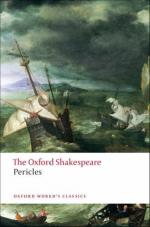|
This section contains 5,973 words (approx. 20 pages at 300 words per page) |

|
SOURCE: Flower, Annette C. “Disguise and Identity in Pericles, Prince of Tyre.” Shakespeare Quarterly 26, no. 1 (winter 1975): 30-41.
In the following essay, Flower explores how the relationship between disguise and identity in Pericles reveals and defines character.
The paradox in Pericles, Prince of Tyre is the paradox of fantasy: that not “realism” but conscious illusion, artfully handled, can most satisfyingly interpret reality. A “mouldy tale” it may be, but such a label is not so much a charge of failure as a badge of success, for Pericles is meant to be a mouldy tale. Its mouldiness and its narrative basis are deliberately exploited. Even the structure of the play depends upon its kinship with narrative fiction, for Gower appears as presenter in order to tell the story, mediating between play and audience like a narrative persona; he interprets, manages, directs the play as we watch it.1 The presence of...
|
This section contains 5,973 words (approx. 20 pages at 300 words per page) |

|


